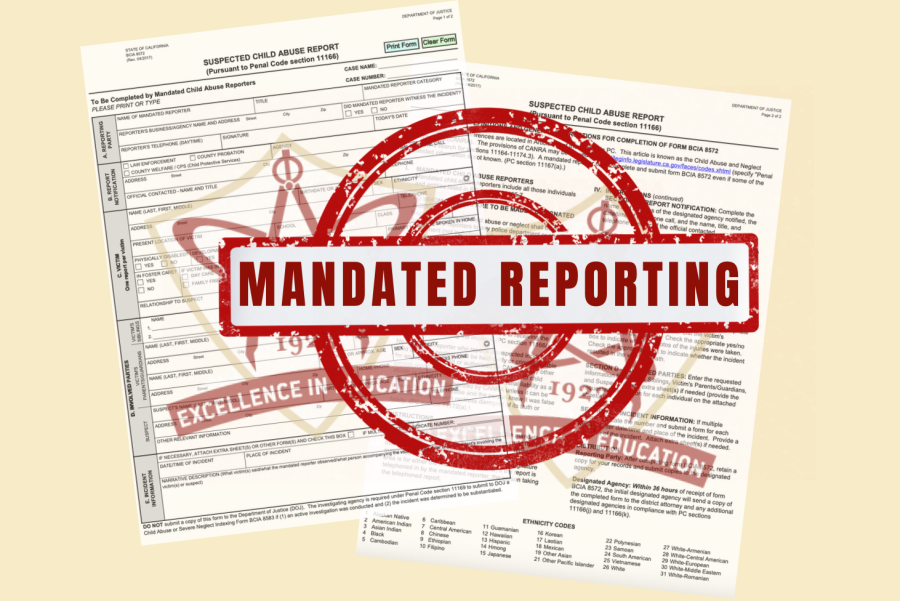What students should know about mandated reporting
Graphic illustration by Katie Chen
It is imperative that students be aware of staff members’ responsibility as mandated reporters for the wellbeing of themselves and their peers, in the case that they find themselves in such a harrowing situation.
March 17, 2021
Trigger Warning: mentions of abuse, sexual harassment
The Federal Child Abuse Prevention and Treatment Act requires professionals in all states and U.S. territories to report suspected child maltreatment, abuse or harassment. In 47 states, including California, all school employees, administrators and athletic coaches are mandated reporters for child maltreatment, yet many students are still uninformed about the systems in place for their protection.
Mandated reporting is the legal requirement that people in positions of authority over children must take action if they have reasonable suspicion of abuse or neglect. Abuse or neglect of a child include physical injury; sexual abuse, assault or exploitation; negligent treatment by a guardian; injury resulting in a traumatic condition or inhumane punishment.
“The key things that we have to ask ourselves when something of a sexual harassment nature is brought to our attention are, ‘Is it pervasive? Is it persistent? Is it severe?’” FUHSD Student Title IX Coordinator Trudy Gross said. “In the situation of something like a rape or a sexual assault, that would be considered severe. We obviously are not waiting for that to be persistent or pervasive, so we are getting involved, then law enforcement would be involved, which doesn’t remove our obligation to investigate.”
School-based therapist Jenna Starnes adds that red flags of child abuse or neglect can come in physical forms, like unexplained bruises or accidents or a lack of necessities like clean clothes or food. Warnings of emotional or sexual abuse are less obvious.
“[Is the student] yelled at often? How are they impacted in terms of emotional well being, via what’s talked about in the home, or frequent conflicts?” Starnes said. “For sexual abuse, if someone does talk about it, it is, more often than not, true that it is occurring, and therefore a mandated reporter should be taking action and making the report to DFCS.”
Reporters do not need to witness the abuse or neglect to report it, as it is not their job to determine whether the allegations are valid. Their responsibility is to report any suspected abuse or neglect for the betterment of the child, regardless of their own wishes.
“The fact that you don’t necessarily need to have a ton of evidence that abuse or neglect is taking place is something I find beneficial because, a lot of times, you don’t know if someone’s going through abuse, but it’s serious, so you should be able to report it,” sophomore Riya Abiram said.
While emotional abuse could warrant different approaches, signs of physical abuse or neglect must be reported immediately.
Nearly all U.S. states have laws designating professions that are required to report child maltreatment, including but not limited to social workers, school personnel, healthcare workers, child care providers, medical examiners and law enforcement officers. One such law is Title IX, a federal civil rights law passed in 1972 that “protects people from discrimination based on sex in education programs or activities that receive Federal financial assistance,” according to the Department of Education. Title IX addresses sexual harassment, a form of sex discrimination, through the designation of mandatory reporters.
“We refer to [mandated reporting] as being your responsibility as an employee to report child abuse and neglect,” Gross said. “Typically, staff report sexual harassment complaints on the school site level. Once this happens, we get involved, and law enforcement would be involved, which does not remove our obligation to investigate, so we have to carefully align with their investigation.”
For further information on Title IX in FUHSD, refer to the Epic’s Staff Editorial on sexual harassment policies in the district.
In California, mandated reporting is required per the Child Abuse and Neglect Reporting Act (CANRA). Its associated penal codes outline that anyone whose duties require direct contact with or the supervision of children may report, including mandated reporters not within the scope of their employment.
Since Jan. 1, 2015, California Assembly Bill 1432 has required local educational agencies to train all employees each year on how to identify and report suspected child abuse and neglect and provide proof that employees received training. Profession-specific, self-guided and free online training modules that range from two to four hours have been developed for mandated reporters.
FUHSD provides mandatory annual training regarding requirements and protocols for staff, all of whom are mandatory reporters. Every year, teachers, athletic coaches and all other school personnel who work with minors must complete a one-hour online training using videos and other modules from Keenan Safe Schools. The training covers what mandated reporting is, how to prevent child sexual abuse, what to report and the steps to take when making a report. Staff are warned about the consequences of failing to make a report, which could result in jail time or a fine.
When making a report, a mandated reporter must contact an appropriate local law enforcement or county child welfare agency, such as the police or sheriff’s department, county probation department or county child protective services. This does not include the school district police department or school security department, so the legal obligation to report a suspected case of child abuse or neglect is not satisfied by reporting the incident to the school or any school personnel. In fact, making a report to Lynbrook or FUHSD administration or even discussing with other school personnel about having to make a report would be a breach of confidentiality.
It is legally required for mandated reporters to make a call reporting the abuse or neglect as soon as possible, before following up with a specific form that is consistent throughout California within 36 hours. If someone who is not a mandated reporter files a report, their identity will remain anonymous. The child’s identity is disclosed only to the person who made the report and the Department of Family and Children’s Services (DFCS), and cases should never be discussed between administration. However, a mandated reporter must provide their name, position and other personal information that may or may not be disclosed depending on whether the DFCS decides to pursue an investigation.
“[As a mandated reporter], you really don’t know when you make a report, whether [the DFCS] will take it and investigate it,” Starnes said.
If the department decides to pursue an investigation, the child and parents that it pertains to will be contacted in order to maintain more information.
“Typically, what [the department] would do from there is see how they could support [the family],” Starnes said. “Could they provide therapy or recommend anger management, or something of that nature?”
Because laws regarding mandatory reporting were originally created to target physical abuse, emotional abuse is generally investigated less because it is difficult to prove that the maltreatment affects the child negatively. CANRA does not require a mandated reporter to report serious emotional maltreatment, which is defined as willfully inflicting or causing “unjustifiable mental suffering.” In certain situations, it is more helpful to take an approach rather than mandated reporting with cases of emotional abuse.
“Your approach might be actually to talk or work with the parents first, versus if you find out about physical abuse, it’s an automatic report,” Starnes said.
During the process, students have a set of rights under Education Code Section 221.8 including fair treatment by the officials handling the reports, protection against retaliation from other parties and the ability to pursue “civil remedies,” such as a lawsuit or out-of-court settlement with the district, if necessary.
“We did have one situation [regarding the gender equality aspect of Title IX] in which the family did not agree with the outcome of our investigation and appealed to the state, and the state agreed that the finding was accurate,” Gross said. “Regardless, it’s important for people to know that they have a right to appeal decisions. In those cases, the state asks us questions, and we look forward to their telling us whether our processes or practices are accurate, and we will adjust these if necessary.”
For further support, Lynbrook provides students with a Wellness Check-in Form to request a meeting with a school therapist or psychologist to discuss any emotional distress that may arise from such incidents.
It is imperative that students be aware of staff members’ responsibility as mandated reporters for the wellbeing of themselves and their peers. Furthermore, educational institutions and educators must make their role as mandated reporters clear to students, in the hopes that awareness of this system can serve as a lifeline for students in crisis.






























































